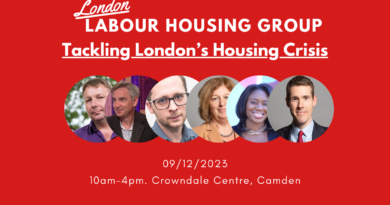London Labour Housing Executive – An Emergency Housing Response to the Covid-19 Pandemic
The Covid-19 epidemic in UK laid bare the cruel deceit of all UK governments in the last decade, that claimed that Britain could not afford to invest its wealth in our NHS, our social care system or in decent social housing. It is likely over a million people will have paid for that lie with their lives and many millions more, in grief for lost loved ones.
Though government spending pledges came tragically late, the response provided us with welcome evidence of what the state can deliver when political will is mustered. It also showed the country benefiting from a creative approach to partnerships for delivering public goods, which needs to be built on for the future.
The pre-Covid promise to ‘level up’ Britain – with renewed commitment to joined up approach to ending health inequalities – must now be delivered on, at scale and at pace, to rebuild our public health defences and our economy. Social Housing investment, to relieve homelessness, chronic insecurity and overcrowding is central to both these imperatives and also offers real and immediate opportunities we cannot afford to squander.
Using public funds for incentives to private individuals for home ownership do not reduce inequalities and they divert investment away from the public goals for housing and public health. Programmes of home ownership incentives for individuals must therefore be suspended until further notice.
We call for government to:
- Keep all emergency housing measures in place until these are satisfactorily superceded by the following:
- Increase the Local housing allowance element of Universal Credit to restore it to the bottom 50% of private rents, to increase access for working households to decent standards in the private rented sector, and remove all caps
- Introduce rent controls to stabilise rent levels in line with and no more than 30% of earnings
- Bring forward a programme to deliver 100,000 new homes in London a year for at least 5 years, of which at least 60,000 a year should be social rented homes, with an average grant of about £250,000 a social rented home. The programme must be:
- local authority led, not developer led, in order to control standards
- local authority commissioned, as the housing pipeline is otherwise at risk of collapse
- including a fund for local authorities to purchase poor quality private rented sector housing and stock for sale as private landlords exit the market, for reinvestment
- including a fund to fully finance remedial fire safety work identified in the aftermath of the Grenfell fire, in social rented and shared ownership housing, where it is not the liability of the Developer
- Liberate housing investment by removing it from government ‘spending’ limits, in line with a majority of other countries
- Require any Buy-to-let landlord who agrees a ‘mortgage holiday’ with their lender to pass this on to their tenants in the form of a full rent holiday for the equivalent period; for all other private tenants, provide a one off payment of LHA/DHP for those that fall into arrears due to loss of income due to Covid-19.
- For licenced HMOs to introduce a temporary higher space and amenity standard in licencing to facilitate social distancing and self isolation, that landlords have to apply if somebody leaves the property – reducing occupancy down to the new requirement by natural ‘wastage’ (not forced eviction).
If the sacrifices that the public have made in the Covid-19 emergency are to mean anything, government must learn from its mistakes, less in its handling of the crisis than in the stripping back of public investment, in the decade before it, that laid the nation low, allowing the virus to disproportionately affect the vulnerable and to deepen the very inequalities the current government pledged to reduce.
We demand that the Mayor of London, on exiting this emergency, commissions a comprehensive housing needs assessment and a strategic planning review that takes account of what epidemiology of Covid-19 has taught us about housing conditions and infection risk, with a focus on the case for providing more houses with gardens and generous internal space standards.
The results of those assessments must inform the scale and pace of the future social house building programme.


